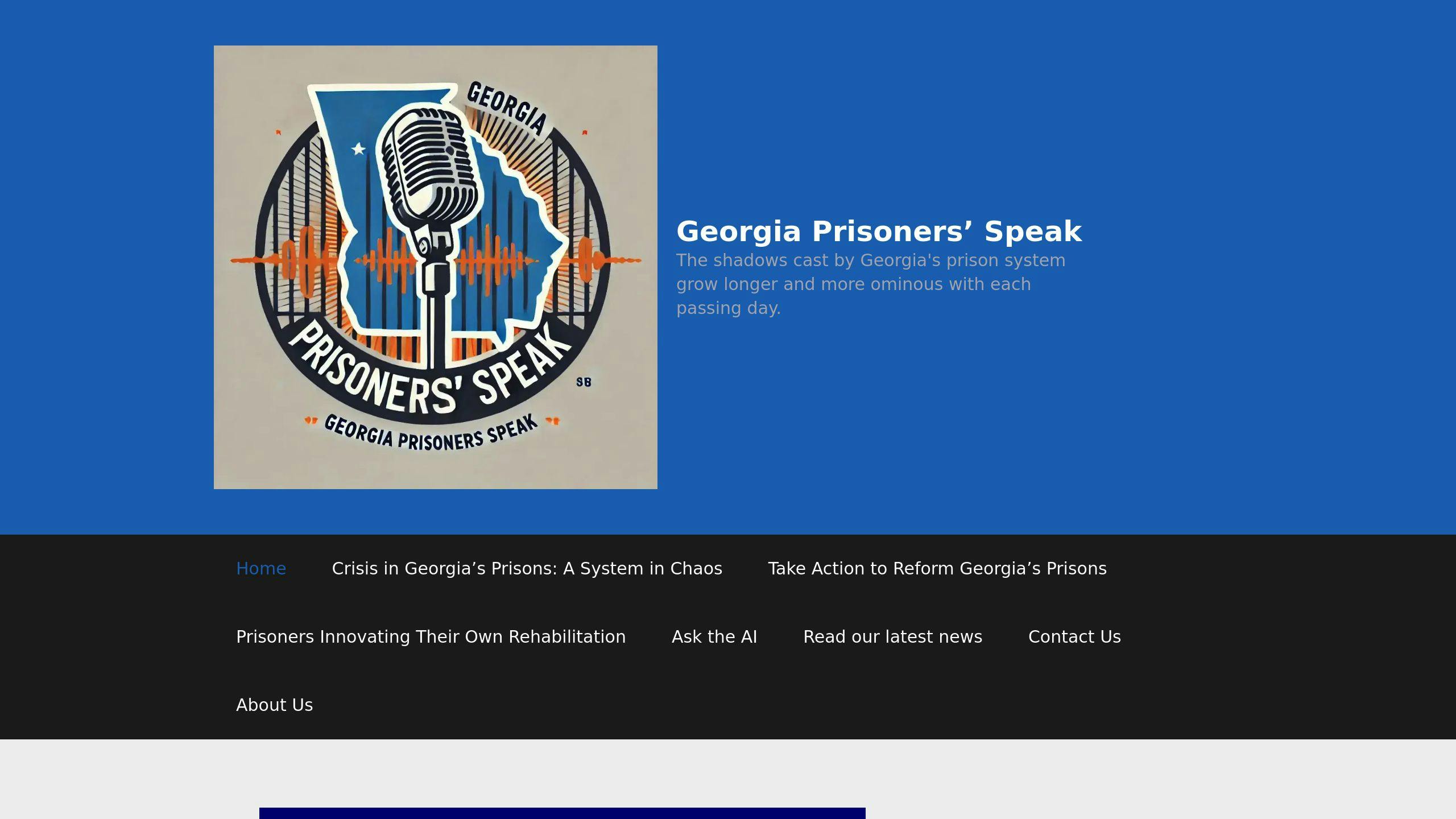Family advocacy is transforming prison reform by addressing how incarceration affects families and communities. Families share personal stories, push for policy changes, and lead grassroots movements to improve prison conditions and reduce incarceration rates. Key takeaways:
- Family-Led Change: Programs like Michigan’s Family Participation Program (FPP) empower families to advocate effectively.
- Policy Successes: Campaigns like "Close the Creek" in Philadelphia reduced prison populations by 33% in two years.
- Challenges: Advocates face barriers like limited access, legal complexities, and emotional strain.
- Grassroots Impact: Organizations like Georgia Prisoners’ Speak (GPS) document systemic issues and drive reforms.
Family advocacy not only influences policies but also strengthens community support systems, creating a foundation for lasting change.
Stephanie and Elizabeth Nodd address shackling in prison
How Family Advocacy Shapes Reform Policies
Family advocacy has become a key driver in changing prison reform policies by shedding light on how incarceration affects families and communities on a deeply personal level.
Groups like Michigan’s Family Participation Program (FPP) use personal stories to reveal the harsh realities of the prison system and change public attitudes [1]. These narratives connect people to the human side of incarceration, sparking awareness and support for change.
Community-driven initiatives led by families help reduce the lasting damage caused by incarceration. Some noteworthy examples include:
| Campaign | Location | Outcome | Timeline |
|---|---|---|---|
| Close the Creek | Philadelphia | 33% drop in prison population | Two years |
| Close the Workhouse | St. Louis | Better prison conditions | Ongoing |
| Family Participation Program | Michigan | Strengthened family support systems | Active |
Family-led campaigns like Close the Creek in Philadelphia and Close the Workhouse in St. Louis highlight how organized efforts can lower incarceration rates and improve conditions inside prisons [2][4]. Additionally, the National Institute of Corrections has introduced policies that prioritize maintaining parent-child relationships during incarceration, showcasing broader systemic changes [5].
Representative Ayanna Pressley’s People’s Justice Guarantee resolution is a strong example of how family advocacy influences legislative efforts [4].
Many of these changes stem from grassroots campaigns, where family voices amplify the push for reform and leave a lasting impact.
Grassroots Movements and Their Role in Reform
Grassroots movements, led by families and local organizations, play a critical role in addressing systemic issues within the prison system. By blending personal stories with organized advocacy, these movements have sparked real change.
Take the "Close the Workhouse" campaign in St. Louis, for example. This effort showed how focused community advocacy could lead to better living conditions for incarcerated individuals. Across the U.S., similar initiatives have proven that community-driven action can lead to meaningful reforms.
| Support Type | Impact |
|---|---|
| Legal Advocacy | Protecting constitutional rights |
| Community Organizing | Raising public awareness |
| Family Support | Offering direct help to families |
| Policy Reform | Driving legislative changes |
Families of incarcerated individuals are at the heart of these movements. Programs like FPP empower families to advocate more effectively, and their influence can be seen in successful reforms across the country.
"Family contact can help incarcerated people cope with being locked up and reduce their chances of returning to prison." – Leah Wang, Prison Policy Initiative [6]
One standout example is Oregon’s family sentencing pilot program. This initiative kept nearly 400 children out of foster care and reduced recidivism rates [6]. Groups like the National Council for Incarcerated and Formerly Incarcerated Women and Girls and the Movement for Family Power continue to push for policy changes that support incarcerated parents [6].
In Georgia, GPS has shown how grassroots efforts can amplify the voices of incarcerated individuals. Through direct advocacy and public awareness campaigns, they’ve pushed for greater accountability and transparency in the state’s prison system.
These family-driven grassroots efforts highlight how collective action can bring about real change in prison reform.
sbb-itb-7858f51
Case Study: Georgia Prisoners’ Speak (GPS)

Georgia Prisoners’ Speak (GPS) showcases how a targeted grassroots initiative can push for meaningful prison reform within a specific state.
What GPS Does
GPS uses a variety of methods to advocate for changes in the prison system. Through its website (gps.press), it provides families with tools to connect with officials and the media, while also raising public awareness and documenting systemic problems.
| Advocacy Focus | Implementation Method |
|---|---|
| Constitutional Rights | Documenting legal violations |
| Prison Conditions | Collecting direct evidence |
| Family Empowerment | Offering advocacy training and resources |
| Stakeholder Engagement | Providing strategic communication tools |
GPS’s Impact on Reform in Georgia
The initiative has made a tangible difference by organizing advocacy efforts and holding authorities accountable. Here are some of the results GPS has achieved:
| Impact Area | Specific Outcome |
|---|---|
| Documentation | Systematic tracking of rights violations |
| Family Support | Resources like template letters and contact lists |
| Media Coverage | More reporting on prison conditions |
| Policy Engagement | Ongoing dialogue with state officials |
By focusing on constitutional violations and systemic corruption, GPS helps families channel their personal struggles into collective advocacy. This approach turns individual stories into a united effort for awareness and policy reform.
At the same time, GPS’s journey highlights the ongoing challenges families face in maintaining advocacy, which will be discussed in the next section.
Barriers and Solutions for Family Advocacy
Common Challenges in Advocacy
Family advocates encounter numerous systemic hurdles when working toward prison reform. These challenges often affect entire communities, making the process even more difficult.
| Challenge | Impact |
|---|---|
| Service Coordination | Fragmented support systems |
| Parent-Child Connection | Strained family relationships |
| Access to Information | Reduced ability to monitor |
| Reform Implementation | Delayed adoption of policies |
One major issue is the lack of collaboration between prison systems and family support services, which makes it harder for incarcerated parents to maintain relationships with their children [5].
Despite these difficulties, families and advocacy groups have found ways to navigate these barriers, using creative tools and forming partnerships to push for systemic change.
Tools and Partnerships for Advocacy
Strategic alliances and shared resources have proven to be effective for family advocates. Programs like the Citizens for Prison Reform‘s Family Participation Program (FPP) show how structured support can empower families with advocacy tools and training [1].
"State policies fail to recognize what so many advocates, researchers, and directly impacted people already know: that state prison incarceration has devastating and far-reaching impacts on family members and entire communities." – Prison Policy Initiative [6]
Some effective strategies include:
- Partnering with advocacy organizations
- Documenting systemic problems
- Creating strong support networks
The National Institute of Corrections offers tools designed to help maintain family connections during incarceration, giving advocates practical resources to tackle these challenges [5]. When combined with community partnerships, these efforts allow families to turn individual struggles into collective reform initiatives.
Conclusion: The Future of Family Advocacy
Key Takeaways
Family advocacy plays a crucial role in driving prison reform by turning personal challenges into broader systemic changes. Programs like the Family Participation Program (FPP), led by Citizens for Prison Reform, show how structured support can empower families to advocate effectively [1].
Mass incarceration deepens existing inequalities, placing heavy financial and emotional burdens on low-income families, particularly women [3]. The long-term impact on families is a pressing issue, as emphasized by Hedwig Lee, Professor of Sociology:
"We cannot afford another 50 years of mass incarceration tearing apart families and communities. It is time to do something revolutionary and invest in data that allows us to fully understand the effects of mass incarceration on families." [3]
Moving forward, family advocates need to focus on actionable steps to address these challenges.
Steps for Future Advocacy
A focused approach includes:
| Focus Area | Actions to Take | Potential Outcomes |
|---|---|---|
| Community and Family Support | Strengthen grassroots movements, expand family support services, and build stronger networks | A unified voice and better resources for affected families |
| Policy Reform | Advocate for alternatives to incarceration and push to end mandatory sentencing | Less family separation and fairer justice practices |
These priorities highlight the importance of targeted reforms and expanded support systems. The future of family advocacy depends on building stronger networks and forming new partnerships. Coordinated efforts have already shown success, such as the reduction of Philadelphia’s prison population [2].
